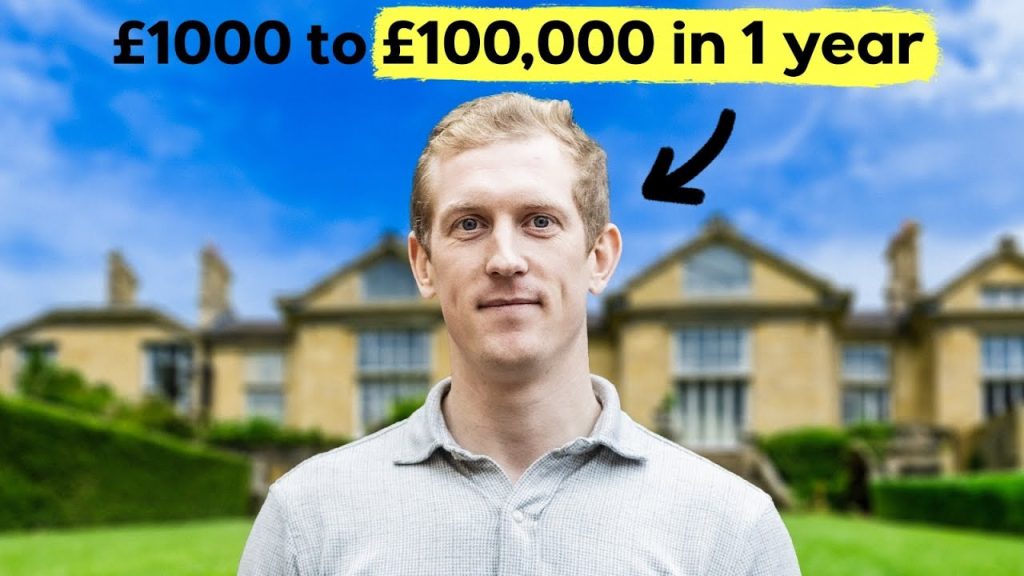Property entrepreneur Martin Adams could have retired after his first venture. He moved out of his house and rented out the rooms, giving him a passive income that pays his bills. But rather than sit back and do nothing, Martin branched out into other investment methods after joining the Samuel Leeds Academy in March 2023. Now the entrepreneur provides temporary accommodation for people having work done on their homes on insurance. He has also just sealed his first lease option agreement.
‘I don’t live lavishly’
Like so many students before him, Martin’s journey into the world of property investing began with the £1 crash course.
He was sat at the front and asked Samuel what he should do with his house. Martin who worked in the building trade had been slowly doing it up. As a result, he had some equity in it but didn’t know whether to refinance or sell it. Then, after attending the crash course, he enrolled on the buy, refurbish, refinance to HMO course.
After the training, he decided that was the strategy he wanted to pursue and rented out his house room by room, having moved out into rented accommodation himself.
“I had a lodger for a while who was paying £700 a month just for the room. I just thought I’ve got four bedrooms here, do the maths, and all of a sudden it makes perfect sense.”
Martin obtained a consent to let agreement from his mortgage lender which allowed him to rent out the rooms in his property. It cost him £250 which was added to his mortgage. Now it turns over around £3,000 a month, half of which is profit, he says.
“That gave me financial freedom, just that one property. I’ve kept my outgoings extremely low. I don’t live lavishly. I’ve got an old van.”
Martin also discovered his house had shot up in value. He bought it for £190,000 a month before Covid hit, putting down a deposit of £35,000, and then spent about £30,000 on refurbishing it.
After extending the bathroom, renovating the kitchen, putting in carpets and redecorating it, the desktop valuation was £300,000. So, Martin opted to refinance it.
“That one purchase alone has pretty much set me up for life because I’m going to pull out over £100,000 and then buy two more properties in the East Midlands. I’m going to do them up and turn them into HMOs and that’s going to boost the value again.”
Financial independence enables Martin to progress quickly
When Martin became a landlord, he had a successful business carrying out French polishing and hardwood floor restorations, but hated what he was doing.
“Unfortunately, I couldn’t manage it properly. There was too much work coming in and I wasn’t delegating my time in the right way. In the end I let that go.”
Then the businessman went into providing luxury property management for a company based in Essex before going into property full time last October.
Financial independence enabled Martin to make progress rapidly after signing up to the year-long academy programme.
“That was the main reason I was able to proceed and excel so quickly. After that, I networked a lot and got a serviced accommodation with my business partner,” he says.
They secured a rent-to-rent deal on a one-bedroom flat in Tunbridge Wells, with Martin obtaining a ten per cent discount on the rent. He also negotiated one month rent-free while they did up the property, with no deposit to pay.
“The refurb cost us about £1,500 and we did that in about three weeks. By the time it went live the bookings pretty much paid for the rent.”
They pay the owner £895 a month and then let it out for a higher amount. It gives them a profit of more than £1,000 a month, which is passive income, he says. Their outgoings are very low. They pay the rent, the utility bills, the Wi-Fi and a cleaner, keeping any money they make on top of that.
Through the academy Martin learnt how to trawl sites like OpenRent, SpareRoom and Gumtree for good deals.
“We found our one on OpenRent which is a platform where you can speak directly to landlords, book viewings and negotiate there on the day.”
Martin was able to show pictures of how he could improve a property and stage it.
“Once the landlord saw what we can do he was happy to reduce the rent and to give a grace period because he knew longevity wise it was going to work for him.”
In return the owner gets peace of mind knowing that his property has been given a facelift and that it will be managed for him. He also receives a guaranteed monthly rent.
The academy provided Martin with the correct contract to use. Martin and his partner have a 12-month rolling contract. If they don’t pay the rent, they can be asked to hand back the property in 14 days under the company let arrangement.
Martin, however, is confident this won’t happen, having found a lucrative income stream from working with insurance companies in the area.
Explaining how the relationship works, he says: “There are a lot of properties around there that are having work done on insurance. So, the homeowners will be having something done to their house which requires them to leave the property and stay somewhere else for a couple of months.
“Because Tunbridge Wells is quite a historic and prestigious area in Kent, they don’t want to leave that. So, we supply them with fairly cheap accommodation in a nice area which is affordable for the insurance company.”
Once the guests leave, the insurance firm brings in a new family needing somewhere to stay temporarily.
The entrepreneur says they found their niche by luck when one of their guests asked if they could stay longer while their house was having work done on it.
“We found out who their insurers were and then we went direct to the insurer and said this is what we can offer you. We can give you a 25 per cent discount on monthly stays and they loved it.”
There is a tiered system in place to ensure the flat is available for long stays. At the start of a week, it can only be booked for a minimum of three days. This requirement rises to seven days for a booking in the following week and then 14 days the week after that. It has to be booked for at least a month after that period.
“That just washes out all the little single bookings in the future. Through the training you learn how to systemise it and make it as hands-off as possible.”
Each guest is sent a welcome pack when they reserve the property, along with the entry details the day before arrival.
“We have a check-up throughout their stay to make sure everything’s OK. Once they leave, they get a [message] saying if they would like to book again there’s a 10 per cent discount.”
A cleaner who has the same diary as them goes in and makes sure everything is in order. If anything needs fixing, she contacts a maintenance man who carries out the repair. Then Martin’s company picks up the bill.
They also use a channel manager, a piece of software which co-ordinates bookings across multiple platforms.
Due to the way the apartment has been systemised, the income from it is virtually passive.
“It’s about an hour away from me and I’ve been there twice in nearly a year. The last time I went there was in October last year. It’s minimal work. That’s what gives me the freedom to then to go up to different parts of the UK to invest elsewhere because I know that looks after itself.”
‘Now I sleep like a baby’
It was through the academy that Martin heard about the lease option agreement strategy. He describes it as the ‘unicorn’ of all the different types of property deals which entrepreneurs like him use to make money in the housing market.
After attending a four-day course on the investment method,’ he went on social media, joining as many landlord and property pages as he could. His hope was that the algorithms would start feeding him information and contacts.
The next day he woke up to find the first post on top of his Facebook page was from a landlord offering his ‘tired’ HMO to anyone interested in taking it on.
Lots of people messaged the landlord, but Martin came out the winner. He is convinced his training gave him the edge.
“I knew exactly what to say and how to present the offer to him. Out of 140 applicants he had, he chose me to go ahead. I think I was the only one out of them that had the Samuel Leeds treatment.”
Two tenants were leaving when he turned up. Then, as the lease option agreement was being drawn up, another tenant left, he says. As the landlord lives in Wales and the property was in Boston in Lincolnshire, it was time-consuming for him to visit it.
Martin has an option to buy it in five years’ time for £130,000. By his calculations it will be worth around £185,000 by then, leaving him £50,000 in equity.
In the meantime, he will rent the five-bed HMO from the landlord and then let it on a room-by-room basis to boost the rental income.
Martin again negotiated a reduced rent. For the first three months the rent is £500 a month, which rises to £750 per month for the remainder of the term of the agreement. He estimates it will cost around £10,000 for the refurbishment, including repairing a roof at the back of the property, fitting new carpets and giving it a fresh link of paint. Then each room will be rented out for £450 a month.
The overheads are low as each tenant is responsible for how much electricity they use, with meters in each room.
“All we have to do is pay for the communal electricity use, like for the oven, the electric showers and all the lights.”
As there is no gas supply, the energy bill is only about £65 a month, with an extra £100 to pay on top of that for the Council Tax.
“The profit on that property will be around £1,200 once it’s refurbished. I’ve already got a couple of tenants who pay for all the bills. So, I’m going to do up the rooms that are currently available and move those tenants into the rooms to keep the cash flow coming in. Then after three or four months it will be fully tenanted out and fully restored.”
When Martin launched his flooring business, he went from having £800 in his bank account to turning over nearly £100,000 in his first year, he says.
“We used to do floors in multi-million pound houses in London and we had contracts with Burberry, Christian Dior and Harrods.”
But the work was hard. “I was going all over Kent and the southeast of England running my business doing 10/15 hours a day and I hated it.”
Now he is never stressed and ‘sleeps like a baby.’ “I have all the time for the gym. I’m eating well and I’ve got so many more friends.”
Martin’s tips
- You have to spend money to then receive it at a later point in life. You might spend £10,000 and in 12 months that pays you tenfold.
- It’s so important to get the right education in property and do your due diligence.
Samuel Leeds’ verdict
“Martin has pulled off some perfect deals and has a brilliant business model with the serviced accommodation. Now he’s positioned so well he can double or triple his income easily within the next six to 12 months. This is just the beginning for Martin. I look forward to seeing what he achieves in the next year.”






